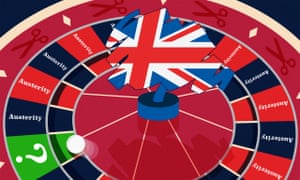
Illustration by Mitch Blunt
According to WH Auden, all good dramas consist of two contrasting acts: “First, the making of a mistake; then, the discovery that it was a mistake.” A similar corrective arc often also applies in politics. On the issue of the progressive role of the state, the late-20th-century Conservative party made a historic mistake. Now it is struggling with the dawning of discovery.
The single most obvious thing to say about the Tory party in autumn 2018 is that it is split over Brexit. But the significance of the Tory divide on Brexit, and its tendency to dominate all aspects of domestic political coverage, masks another internal argument – one that is more important in terms of the party’s history, and may hold the key to its future too.
This second argument is about the necessary role of government in shaping economic and social policy. One way or another, this is an issue that has woven its way through Conservative history since the late 18th century. Tory leaders from William Pitt the Younger to Theresa May have confronted it. Philip Hammond’s budget this week was a striking embodiment of why the issue is both enduringly important and still politically unresolved.
His budget was not the end of austerity. But it was unquestionably a decisive move away from it. If the austerity doctrine of 2010-18 had still been in full force, the £68bn windfall in government receipts over the next five years announced this week would have been overwhelmingly used to get the finances back in the black by the mid 2020s as planned. Instead, the normally cautious Hammond chose to spend the lot, mainly on the NHS, but also in a cluster of short-term giveaways and to pump another £15bn into the economy next year.
This would not have happened in the previous eight years. It has happened because May is trying to reposition her party more centrally on domestic policy in the aftermath of the Brexit deal she hopes to secure. May herself would probably have gone further this week.
May and Hammond are not trying to “out-Corbyn Corbyn”, as former chancellor George Osborne put it this week in an interview in which he offered a mea culpa on the EU referendum but not on austerity. But they see the need to counter the Labour leader. This was in many respects a holding budget, but it placed anti-austerity options in tax and spending and in the role of government back on to the Tory agenda.
May and Hammond are a bit like a couple circling a roundabout in their car, debating which route to follow, but clear which one they should no longer take.
This is where Auden’s point comes in. Many times in its pre-1975 history, the Conservative party found its way, often against its supporters’ instincts and interests, towards strengthening the role of government in rebalancing the economy in favour of the poor and the moderately waged. From Robert Peel’s reintroduction of peacetime income tax in 1842 onwards, the one-nation tradition was the key to the party’s famous ability to reinvent itself.
The problem the modern Tory party faces is not confined to the unpopularity of austerity. Its roots lie in the period after 1975, when Margaret Thatcher – massively aided by the press – captured the party with her rejection of postwar Keynesianism in favour of an agenda of privatisation, small government, tax cuts and individualism. It won the Tories four successive elections. But it was also massively destructive and divisive.
The Conservatives have not won a decisive general election majority since Thatcher did so in 1987. John Major, David Cameron and May have all led weak governments. In spite of efforts by all three, the party seems unable to move decisively beyond Thatcherism or to reconnect fully with its one-nation past at a time when it is needed. As one senior Tory put it bluntly to me recently: “We will never win a clear majority while we remain in thrall to Margaret Thatcher.”
According to WH Auden, all good dramas consist of two contrasting acts: “First, the making of a mistake; then, the discovery that it was a mistake.” A similar corrective arc often also applies in politics. On the issue of the progressive role of the state, the late-20th-century Conservative party made a historic mistake. Now it is struggling with the dawning of discovery.
The single most obvious thing to say about the Tory party in autumn 2018 is that it is split over Brexit. But the significance of the Tory divide on Brexit, and its tendency to dominate all aspects of domestic political coverage, masks another internal argument – one that is more important in terms of the party’s history, and may hold the key to its future too.
This second argument is about the necessary role of government in shaping economic and social policy. One way or another, this is an issue that has woven its way through Conservative history since the late 18th century. Tory leaders from William Pitt the Younger to Theresa May have confronted it. Philip Hammond’s budget this week was a striking embodiment of why the issue is both enduringly important and still politically unresolved.
His budget was not the end of austerity. But it was unquestionably a decisive move away from it. If the austerity doctrine of 2010-18 had still been in full force, the £68bn windfall in government receipts over the next five years announced this week would have been overwhelmingly used to get the finances back in the black by the mid 2020s as planned. Instead, the normally cautious Hammond chose to spend the lot, mainly on the NHS, but also in a cluster of short-term giveaways and to pump another £15bn into the economy next year.
This would not have happened in the previous eight years. It has happened because May is trying to reposition her party more centrally on domestic policy in the aftermath of the Brexit deal she hopes to secure. May herself would probably have gone further this week.
May and Hammond are not trying to “out-Corbyn Corbyn”, as former chancellor George Osborne put it this week in an interview in which he offered a mea culpa on the EU referendum but not on austerity. But they see the need to counter the Labour leader. This was in many respects a holding budget, but it placed anti-austerity options in tax and spending and in the role of government back on to the Tory agenda.
May and Hammond are a bit like a couple circling a roundabout in their car, debating which route to follow, but clear which one they should no longer take.
This is where Auden’s point comes in. Many times in its pre-1975 history, the Conservative party found its way, often against its supporters’ instincts and interests, towards strengthening the role of government in rebalancing the economy in favour of the poor and the moderately waged. From Robert Peel’s reintroduction of peacetime income tax in 1842 onwards, the one-nation tradition was the key to the party’s famous ability to reinvent itself.
The problem the modern Tory party faces is not confined to the unpopularity of austerity. Its roots lie in the period after 1975, when Margaret Thatcher – massively aided by the press – captured the party with her rejection of postwar Keynesianism in favour of an agenda of privatisation, small government, tax cuts and individualism. It won the Tories four successive elections. But it was also massively destructive and divisive.
The Conservatives have not won a decisive general election majority since Thatcher did so in 1987. John Major, David Cameron and May have all led weak governments. In spite of efforts by all three, the party seems unable to move decisively beyond Thatcherism or to reconnect fully with its one-nation past at a time when it is needed. As one senior Tory put it bluntly to me recently: “We will never win a clear majority while we remain in thrall to Margaret Thatcher.”

Harold Macmillan: many of today’s Conservative MPs relate to his approach. Photograph: Fox Photos/Getty Images
Brexit is tightly bound in to this problem. Most ardent Brexiteers are ardent Thatcherites, just as most Thatcherites are Brexiteers. Many of the most threadbare of the Brexit fantasies – those about easy free trade deals, a no-deal break with the EU, Singapore-style deregulation and Britain’s supposedly enhanced standing in the world – contain ghostly echoes of Thatcher.
But the central issue is political economy. In 1938, Harold Macmillan warned the Tory party: “Unless we can continue this peaceful evolution from a free capitalism to planned capitalism, or, it may be, a new synthesis of capitalist and socialist theory, there will be little hope of preserving the civil, democratic and cultural freedoms.” No Tory MP would write in such terms today. But the essence of this warning remains valid on many levels 80 years on.
Today’s party contains more MPs who relate to Macmillan’s approach than you would ever guess from the constant publicity given to the Brexiteers. The most prominent of these is May herself, with her repeated – but unfulfilled – commitment to the section in the 2017 manifesto that said “government can and should be a force for good – and its power should be put squarely at the service of this country’s working people”.
May is not alone. Justine Greening said this week that the Tories should “get into the centre ground” and that they had not properly connected with the public in more than 30 years. George Freeman wrote in September that aspirational professional voters under 45 are rejecting the old politics. “Unless the Conservative party reconnects with them, we risk becoming a rump party of nostalgic nationalists,” he claimed. Nicky Morgan wrote last month that “we cannot secure growth in the 21st century by following a 20th-century model”. Jesse Norman, in his recent book on Adam Smith, writes: “It is easy to forget the central importance of the state in his thought, as protector of the nation, adjudicator and enforcer of justice … provider of public works, infrastructure and local schools, and, yes, as regulator of markets.” Most of the 2010 and 2015 Tory intakes share these instincts.
These MPs do not have identical views. But they all share the crucial recognition that government is, as the US writer Garry Wills puts it, “a necessary good not a necessary evil”. If Labour people tend to be too starry-eyed about government, too many Tories, influenced by Thatcher’s aberrant period of power, tend to be unduly distrustful of it. The public, who depend on good government, do not share either view.
The most interesting current question in British politics is this: what comes after May’s Tories and Corbyn’s Labour? My guess is that a large part of the answer will depend on the road May and Hammond decide to take off the roundabout to which they have belatedly returned this week.
No comments:
Post a Comment